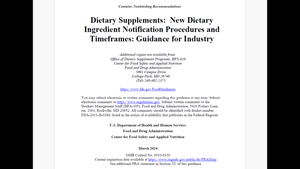Coca-Cola, Vitaminwater Proposed Class Action Lawsuit Likely to Move Forward
.png?width=850&auto=webp&quality=95&format=jpg&disable=upscale)
BROOKLYN, N.Y.Has Coca-Cola Company duped New York and California consumers about the benefits of its "vitaminwater"?
That question is at the heart of a 4-year-old complaint that a federal magistrate judge has recommended be certified as a class action lawsuit. But if you are one of the hundreds of thousands of consumers in the proposed classes, don't expect a refund.
Robert Levy, a U.S. Magistrate Judge and adjunct law professor, has recommended certification of the New York and California classes for the purposes of seeking "injunctive and declaratory relief". But he is recommending denial of class certification to the extent the plaintiffs are requesting money damages, including restitution and disgorgement of profits.
A U.S. District Judge, Dora Irizarry, will decide whether to implement those recommendations in a 2009 case that was filed against Coca-Cola and its subsidiary Energy Brands, Inc., which does business as Glacéau.
In an article by Reuters, which first reported on the court's recommendations, a Coca-Cola spokesperson said the company feels the plaintiffs' claims generally "are without merit and will ultimately be rejected."
Coca-Cola has been defending itself against allegations that the labeling and marketing of vitaminwater is deceptive.
"The product name (vitaminwater), description (Nutrient Enhanced Water Beverage), and slogans such as 'vitamin+water=all you need' together with flavor names that are associated with specific purported health benefits, mislead consumers to believe that vitaminwater is simply water fortified with nutrients that will provide certain stated health benefits rather than just another sugar soft drink," the plaintiffs allege in court documents.
Three years ago, a federal judge denied, in part, Coca-Cola's request to throw out the case as a matter of law.
"The FDA has recognized that product names such as 'vitaminwater' can be deceptive in that such names may mislead consumers into believing the listed ingredients are the sole component of the beverage," U.S. District Judge John Gleeson wrote.
In the proposed class action lawsuit, plaintiffs have sought both money damages and injunctive relief. They have argued that their primary motivation in the lawsuit is "to change the labels on vitaminwater." But Levy didn't find that argument persuasive.
"While plaintiffs describe their pursuit of monetary relief as secondary to their desire for injunctive relief, it is clear that monetary relief is central to their claims, or at least of equal importance," he wrote, "since the crux of their complaint is that they paid a premium for vitaminwater, or purchased vitaminwater instead of another beverage, in the belief that the name implies health benefits."
Scott+Scott LLP, Reese Richman LLP and the Center for Science in the Public Interest have asked the court to serve as class counsel.
This is not the only case in which Coca-Cola's vitaminwater has been accused of duping consumers. In 2011, the National Consumers League (NCL) filed a complaint with the Federal Trade Commission. Characterizing vitaminwater's advertising and labeling claims as "dangerously misleading", the NCL urged the FTC to halt statements that suggest vitaminwater can replace flu shots and prevent illness.
In a January 30, 2012 letter to NCL, the FTC stated it was closing its investigation because Coca-Cola had discontinued the advertising claims that the consumer group had complained about.
"This is a great example of the power for change that consumer groups and an informed and motivated public can have," Teresa Green, NCL's Linda Golodner Food Safety & Nutrition Fellow, told Food Product Design.
About the Author(s)
You May Also Like






.png?width=800&auto=webp&quality=80&disable=upscale)